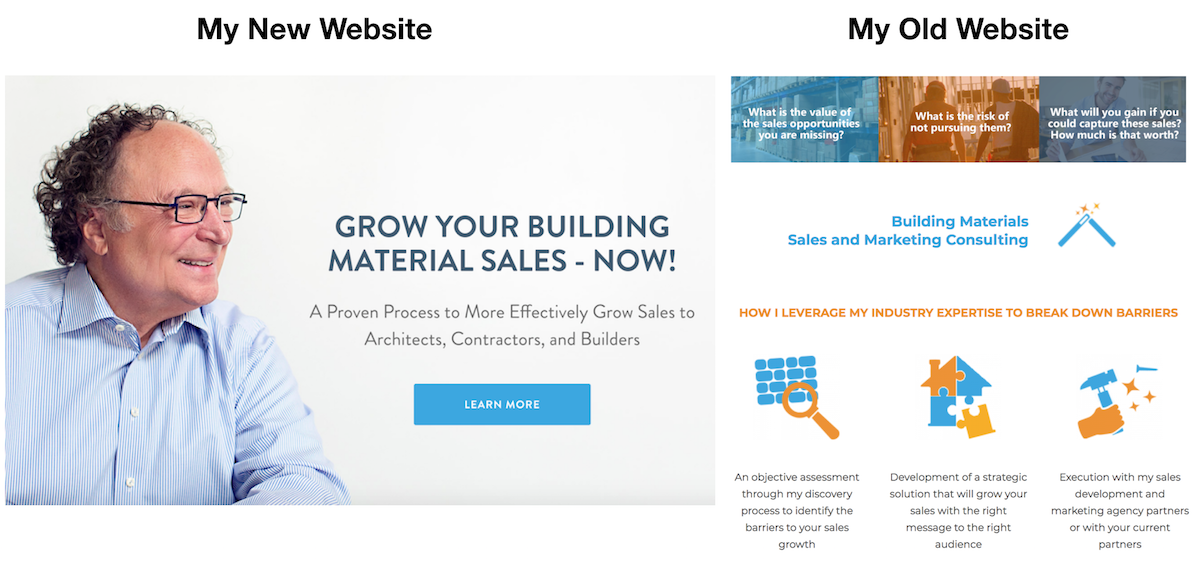The products you sell and the value you deliver to your customers needs to be obvious right from the moment a visitor clicks on your website. Potential customers won’t take the time to read through a bunch of hype and buzzwords on your home page in hopes of finding out what you do.
A Fast and Easy Way to Assess Your Website
The first thing you should do when evaluating your website is something that probably never occurred to you when designing it: get the opinion of someone who knows absolutely nothing about your product, your company or your industry.
Find someone who is totally green to what you do (it could even be a complete stranger you found at Starbucks) and ask them to look at your website. Give them three seconds to look it over before closing the laptop and then ask them what your company does, what it sells and who it’s for.
If you’ve got a typical building materials website, you’ll get responses along the lines of, “Well, it’s an innovative company but I’m not sure what they make,” or “They’ve been in business since 1925 but I couldn’t tell what industry they’re in,” or “Their products will save energy but it didn’t say how.”
Comments like these are a bad sign. They mean a lot of people will find your website but leave it before they learn what you’re selling or how it could benefit them.
That information might be somewhere on the homepage, but most visitors won’t stick around long enough to find it. According to the Nielsen Norman Group, “To gain several minutes of user attention, you must clearly communicate your value proposition within 10 seconds.” Or in plain English: people only spend a few seconds on a website before deciding whether it will be valuable to them or whether they should look elsewhere.
Your Website Should Speak to New Customers
Your average customer is probably very busy, a little bit overworked and might feel like they’re falling behind in their job. Their time is scarce, so they put a premium on it. They won’t waste it playing detective, digging through your website for clues about what you do.
If your message isn’t clearly stated at the top of your website, then it’s designed to speak to people who already know what you do and who are already interested in buying from you.
Those aren’t the people your homepage is for. The first few sentences visitors read should be aimed directly at the people who have no idea who you are or why they should care about your product.
2. Your Salespeople Assume the Customer Knows More Than They Do
It would be bad enough if this was just a problem with building materials websites, but I’ve seen a lot of salespeople make the same kinds of assumptions.
It happens more often than you would like to imagine: a salesperson sits across from an architect, a builder or a contractor and launches into a pitch that either assumes the customer already knows about the product or that they’re willing to sit there and figure out the benefits for themselves.
Get to the Point
In a lot of ways, sales and marketing people are storytellers. Their job is to tell a story about the product they’re selling so the customer can see themselves using it. But many of them violate one of the most fundamental rules of good storytelling: they never get to the point.
What’s the point of your story? Well, it depends on your product. It could be that it will make installation easier and cut down on the amount of labor required. It could be that it’s more energy efficient than what the customer is currently using. It could be that it will last ten years longer than the competing brand.
Whatever the point of the story is, get to it right away. Show the customer why they should be interested in your product, don’t assume that they’ll do all the work of figuring it out.
Free Up Your Customer’s Mental Space
If you assume your customer already knows the point of your story, or that they’ll be able to immediately connect the dots between your product and how they would benefit from it, you’re missing a huge opportunity to gain your customer’s interest.
When your customer is busy trying to work out what your product does or how it could be valuable for them, they won’t be ready to ask more questions about it. All their mental space is used up with listening to your salesperson and trying to connect those dots. Giving them a good, clear statement of the value your product delivers will free up all that mental space and them allow them to get curious and start asking the kinds of questions that could lead to a sale.
Your sales team probably has a habit of assuming too much. They’re so familiar with your product, they think everything about it is obvious and it would be a waste of time to spell it all out. It’s not. Take the time to remind them that they need to educate the customer, not just act as the point of contact for customers who already happen to be interested.
3. You Assume the Customer Sees You in the Best Possible Light
Another assumption I see a lot of sales and marketing people fall into is thinking that the customer will have a glowing picture of the company and its products.
They’ll keep going on and on as if the customer already loves the company or thinks that, say, the fiberglass bathtubs they’re selling must be great.
That’s a risky assumption.
While your salespeople are busy talking up your company and its products, the customer might have some nagging doubts in mind. They might have heard that shipping is an issue with your company, or maybe they tried another fiberglass product in the past and had a lot of challenges with it.
But if your salespeople are just patting themselves on the back the entire time, the customer probably won’t bring these things up. They might just nod, smile politely – and never buy from you or answer (or even open) any follow-up emails.
The customer’s preexisting notions can be a barrier to the sale. It’s hard for them to really hear what your salespeople are saying if they’re just thinking that it would be too much trouble to start buying from you or if they’re wondering why your product is so expensive compared to other brands.
Your salespeople need to draw out their opinions, to find out how they feel about what you’re selling. That means engaging in a conversation and asking questions like “Have you considered using fiberglass before?” or “How much does the product you currently use cost?” That will open them up to voicing their concerns about buying from you and give your salespeople the opportunity to speak to those issues.
Addressing those concerns can often be enough to cut through the hesitation and land a sale.
Conclusion
We often make things too difficult for our customers. Without realizing it, we outsource a lot of the work of figuring things out and connecting the dots to them. The result is usually a customer who has lost interest.
Every building material company should be working harder to spell out the value of their services and products in a clear and concise way.
The best way to do that is to start questioning your assumptions. Imagine that your customer knows absolutely nothing about you. If you only had 10 seconds to convince them to listen to you, what would you tell them?
Subscribe To My Newsletter
If you like what I say, sign up for my newsletter here and get my weekly newsletter every Sunday night.
What Others Are Saying
“Really loved this one.” Dana Schindler, Chief Marketing Officer, Associated Materials

 12 Reasons Your Building Materials Sales Messages Are Ineffective
12 Reasons Your Building Materials Sales Messages Are Ineffective How to Gain More Interest in Your Building Product
How to Gain More Interest in Your Building Product The 3 Least Effective Words in Building Material Sales
The 3 Least Effective Words in Building Material Sales 5 Ways Building Material Sales Messages Fail
5 Ways Building Material Sales Messages Fail Want Me to Buy Your Building Product? Show Me How You Make It.
Want Me to Buy Your Building Product? Show Me How You Make It. How Context Matters in Building Materials Sales and Marketing
How Context Matters in Building Materials Sales and Marketing


